History of Medicine. Ancient Greece
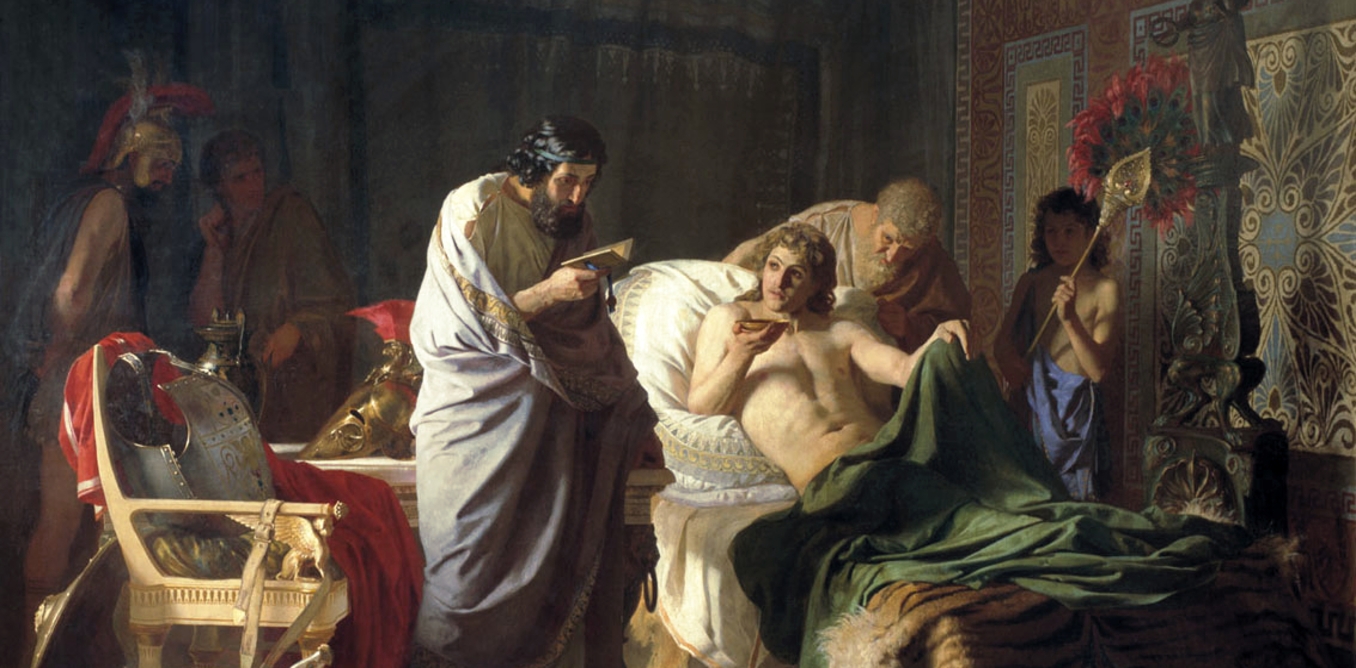
The ancient Greeks regarded the disease as a divine punishment and healing. If absolutely literally, as a gift of the gods. But by the V century BC The Greeks were already trying to understand the material, rather than the spiritual causes of disease, which led to a gradual transition from superstition to scientific research. Although in reality they were never completely separated from each other.
For example, the god Asclepius was considered a donor of healing and at the same time a highly qualified practitioner. Despite the obvious period of enlightenment, many doctors still continued to turn to their gods, if the treatment did not give the desired effect. Asclepius was the Greek god of healing, and in Epidaurus was the temple of Asclepion .
Some doctors treated their patients, and then drove them to the abaton - a holy place in the temple - so that they would sleep there all night. The Greeks believed that Gigay and Panakey , the daughters of Asclepius, would arrive at the temple with two holy serpents that would cure the patients. Part of this symbolism has survived to this day. Today, the snake is a symbol of pharmacists, the word “hygiene” was formed on behalf of Hygea, the panacea is a universal cure for all diseases, and we call the doctors physically jokingly.
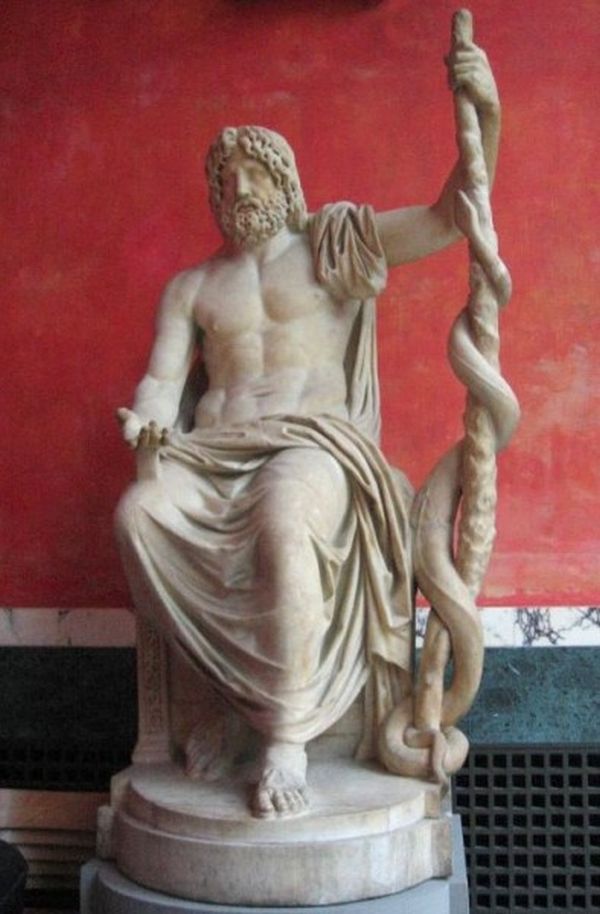
Statue of Asclepius
At the same time, Greek doctors began to be interested in the device of the human body and explore the relationship between cause and effect, the relationship of symptoms to the disease itself and the success or failure of various treatment methods. Greek medicine was not a combination of knowledge and practice, but was a set of methods and beliefs that depended on geography, periods of time, local traditions, and even the gender and social class of the patient.
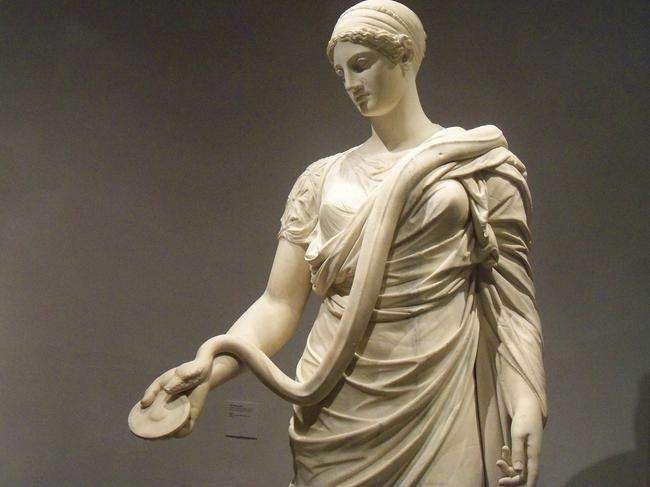
Statue of gigay
In general, medical thought in ancient Greece is permeated by two main ideas - concern about the positive and negative effects of diet and the belief that the patient can really overcome the disease, unlike the more fatalistic and spiritual thinking of earlier times.
From theory to practice
Symptom observation is a hallmark of Greek doctors. They found that lifestyle and factors such as heat, cold, or trauma are important because they can alleviate or worsen the disease or its symptoms. They also recognized that the constitution of a person’s body can affect the severity of illness and its susceptibility to it. At the same time, the Greeks were strengthened in their opinion that a better understanding of the onset of symptoms of the disease can help in combating the ailment itself. Together with a great understanding of the work of the human body came the conviction that the imbalance of body fluids may be one of the factors causing the disease.
Due to the fact that doctors did not have professional qualifications, anyone could become a doctor and travel in search of patients with whom they could practice what was known as a technique (or art, albeit mysterious) of medicine. Only the Spartans were people responsible for medical care in a professional army.
Practicing doctors enjoyed great respect, despite the lack of a recognized professional body that monitors and prepares future doctors. In ancient Greece, not only doctors could treat and give medical advice, but also midwives, athletic trainers and all those whose practical experience regarding the health of the body and the human body could be useful to others.
We know that the Greeks dismembered dead bodies (and sometimes living) to find out what was going on inside. But historians of medicine have not found any reliable confirmation that the Greeks performed surgery on the internal organs. As in ancient Egypt, the Greeks did not have any painkillers and only a few herbal antiseptic mixtures. Greek policies were constantly at war with each other, which gave doctors a great deal of practical first-aid experience. Ancient Greek physicians became qualified specialists. The Greeks well cracked broken bones and recorded dislocations.
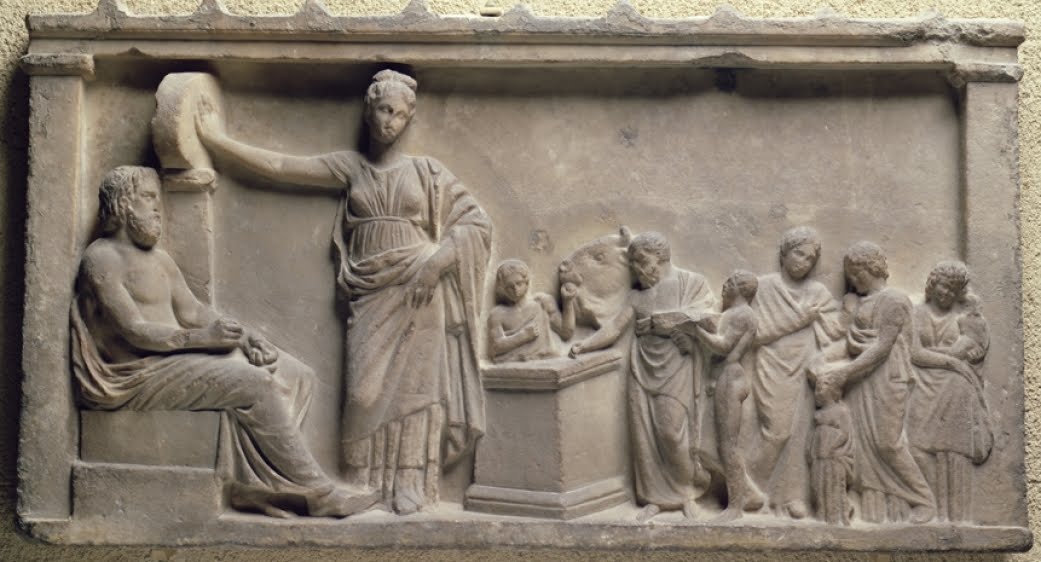
Sacrifice to Asclepius
Over time, magic and appeals to the gods gave way to the search for the natural causes of disease. This led to the study of natural medicines. Greek doctors became expert herbalists and often prescribed natural remedies to patients for their illnesses. They were convinced that no one could cope with the treatment better than nature.
Medical writings
The first mentions of the peculiarities of Greek medicine appeared in Homer's Iliad scenes, where the wounded in the Trojan War are treated. It describes, for example, how Patroclus washes the wound of Euripil with warm water.
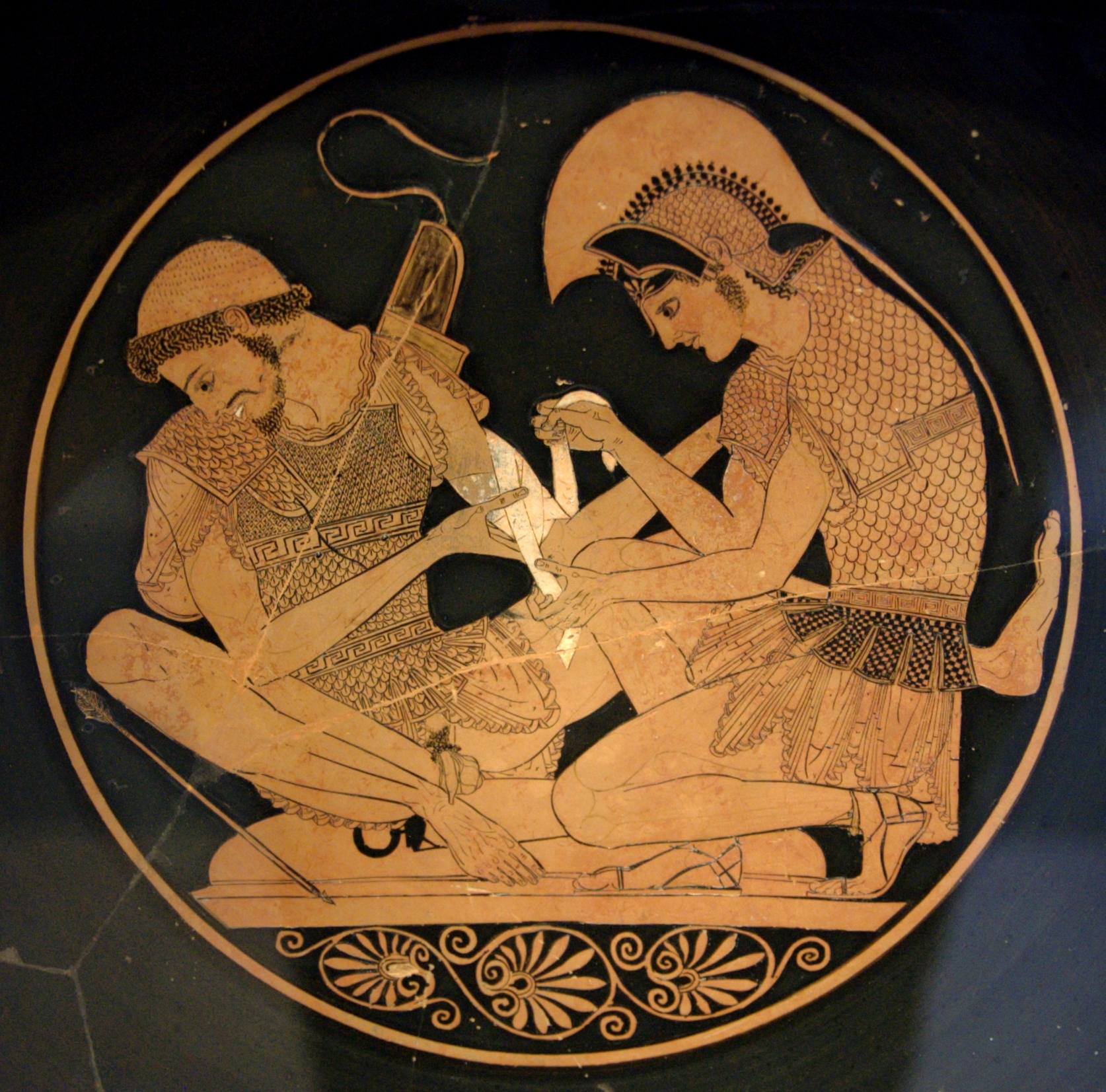
Achilles, bandaging hand Patroclus
Medical scenes and doctors are also often mentioned in other types of Greek literature, such as comedy plays. The most detailed sources of about 60 treatises, which are often attributed to Hippocrates - the most famous ancient Greek healer. However, historians still can not unequivocally establish whether they were written by Hippocrates or by someone else. The texts attributed to Hippocrates deal with various medical topics that can be grouped into the main categories of diagnosis, biology, treatment, and general recommendations for physicians.
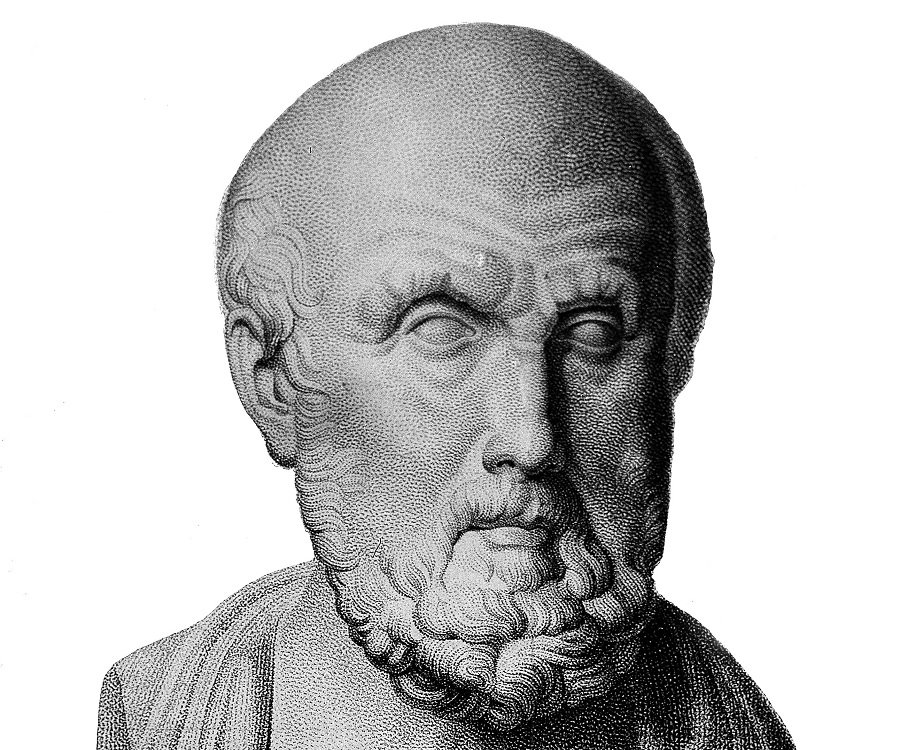
Hippocrates
Other sources of knowledge about ancient Greek medicine are texts from the field of natural philosophy, dating back to the 6th-5th centuries BC. Philosophers associated good health and state of mind and soul, often concerned directly or indirectly with the thought of the human body and medicine. Among these thinkers are Plato, Empedocles of Akragant , Philisty Locri, and Anaxagoras .
Pioneers of greek medicine
According to ancient records, one of the earliest Greek medical schools was founded in Knid in the V century BC. e. Alkmeon of Kroton worked at this school, and it was under him that the practice of patient observation began. He is considered one of the most prominent medical theorists and philosophers in ancient history.
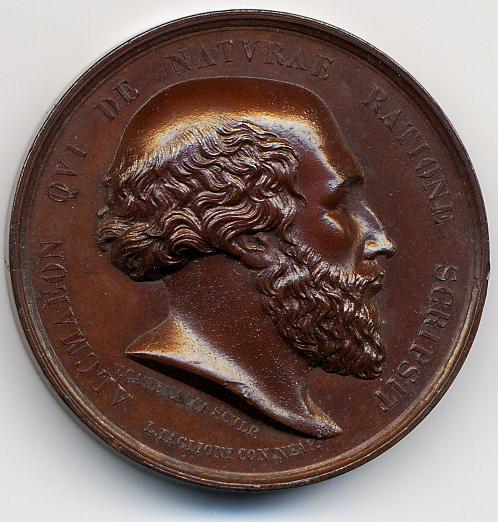
Alkmeon of Croton
Some researchers believe that he was a practicing physician and part-time student of Pythagoras, while others deny this, as they are sure that he was engaged only in theoretical research. Be that as it may, historians agree that he was the first person who wondered about possible internal causes of the disease. Alkmeon suggested that the disease may be caused by environmental problems, poor diet and lifestyle.
The first scientific schools developed in Sicily and Calabria - in the territories that today belong to Italy. The most famous is the Pythagorean school. The great mathematician Pythagoras introduced his theory of numbers into the natural sciences - at that time there was no such area of knowledge as medicine.
The followers of Pythagoras believed that some figures had special meanings, especially with regard to 4 and 7. For example, the product 4 and 7 represents the duration of the lunar month, as well as the menstrual cycle in women. If you multiply 7 by 40, you get a full healthy pregnancy in 280 days. The Pythagoreans also believed that the child would be more healthy if born on the 7th month of pregnancy. It was believed that the quarantine duration of 40 days would avoid infection, since the number 40 was sacred.
The most famous and probably the most important medical figure in ancient Greece was Hippocrates , who is now often called the father of medicine. The medical school founded by him made a kind of revolution in the scientific knowledge of that time and defined medicine as an independent discipline.
Hippocrates is credited with creating the oath of the same name - a vow taken among medical students when they become qualified doctors. Today, other health care professionals also take this oath. Some classical scholars, such as Ludwig Edelstein, believe that the oath was created by the Pythagoreans, but it is not known for certain.
It is also believed that Hippocrates owns the idea of clinical medicine - studying the disease through direct examination of a living patient. Historians of medicine say that Hippocrates himself and his students were bound by an oath and strict ethical code. Students who paid for joining the ranks of students were met by teachers as if they were members of the same family. Teaching medicine included oral teaching and practical work as an assistant teacher - according to the oath, the student should interact with patients.
Hippocrates and his students were the first to correctly describe certain diseases and disorders. It is believed that Hippocrates first described the symptom of drumsticks , or as it is also called, Hippocrates finger syndrome.
Two famous philosophers - Aristotle and Plato - concluded that the human body was not used in the afterlife. This idea influenced the way of thinking of Greek doctors, who, while in Alexandria, learned how to do an autopsy on corpses and study them. It was thanks to these studies that the surgeon Herophilus (335-280 BC) came to the conclusion that it was not the heart that controls the movement of the limbs, but the brain. Erystratus (304-250 BC) discovered that blood passes through the veins, but he did not pay attention to the fact that it circulates.
The philosophy of Aristotle and Plato, their works and speeches allowed the Greeks to obtain and systematize knowledge about the internal structure of the human body. The Greek historian Thucydides (c. 460-395 BC), who is considered the “father of scientific history”, came to the conclusion that prayers are completely ineffective in the treatment of diseases. He added that epilepsy has a scientific explanation and is in no way connected with angry gods or evil spirits.
For nearly 2,000 years (until 1700 AD), a theory existed about the relationship between health and the balance of four major fluids — blood, sputum, yellow and black bile — in the human body, which the Greeks adopted from the Egyptians.
Hippocrates, in his work “The Constitution of Man,” writes that four fluids make up the human body: “through them, he feels sick or enjoys health. When all fluids are properly balanced and mixed, he feels completely healthy. A disease occurs when one of the fluids is in excess or decreases in quantity or is completely absent in the body. "
In his books, he offers the following recipes:
For diseases of the chest - barley soup plus vinegar and honey, which increase sputum.
For pain in the side - dip a large soft sponge into the water and gently rub it. If the pain reaches the collarbone, it is recommended to bleed at the elbow, until the blood turns bright red.
With pneumonia, take a bath. It will relieve pain and help increase sputum.
Trying to balance the four fluids in patients' diseases, doctors sometimes managed to overcome them, even if the cause of the disease lay elsewhere. In an attempt to balance the patient's natural temperature, with colds, the doctors kept them warm, kept the patients with fever dry and cool, bled to restore balance, washed the body to restore biliary balance.
Public health
Greek authorities have not thought about the need for public health. City-states did not seek to provide all citizens with a good supply of water so that they could regularly perform hygienic procedures and keep their homes clean. There were no public sewer systems either. Of the three children born, only two lived to two years. The life expectancy of a healthy adult Greek was about 50 years.
According to Hippocrates, poor people are too focused on making ends meet to worry about their overall health. What could not be said about the rich and educated Greeks: they worked on maintaining a constant body temperature, brushing their teeth, regularly taking baths and watching their diet. Their goal was to maintain the balance of four fluids in the body throughout the year.
Despite the fact that religion was slowly inferior to logical reasoning, the Greeks still urged the gods to heal them in Asclepius. In the end, these temples have become health resorts, gymnasiums, public baths and sports stadiums.
The methods of diagnosis by Greek doctors did not differ from those used today. Many of the natural means of preventing disease are in many ways similar to the effective home remedies used in our time. But despite the advanced views and approaches for that time, the theory of four fluids strongly hindered the development of medical practice.
All Articles